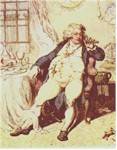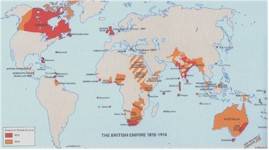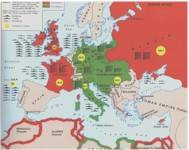 |
Nelson's victory at sea in 1805 and
Wellington's (left) on land at Waterloo in 1815, marked
the end of major wars for a century. Britain was the
dominant power, and the defeat of Napoleon (right)
removed French aspirations to rule the world |
 |
| The death of George IV (right)was not
regretted by the nation - the Times wrote "there was
never an individual less regretted by his fellow
creatures than this deceased king" |
 |
It was an age of poets - Keats, Shelly
and Byron. Of Science - Faraday and Davy in electricity,
Stephenson with his steam train , artists like Constable
and Turner. It was against this background that Victoria
came to the throne in 1837, to commence a reign that
spanned 64 years |
 |
Victoria (left) was 18 when she became
queen. She became a symbol of her age. It was an age of
steam and iron, men like Brunel came to prominence, He
surveyed the Great Western railway to Bristol, he built
bridges and tunnels that still exist today, he built the
Great Eastern, the largest ship afloat. |
 |
| The Great Exhibition of 1851 in Hyde Park
was a showcase for British achievements. Authors like
Dickens (below) and the Bronte sisters wrote novels. A
new parliament building was constructed at Westminster
after the old building burnt down |
 |
1854 brought British involvement in the
Crimean War in Russia, and one of those heroic defeats
when the Light brigade charged massed Russian guns. One
outcome of this defeat was that in future the British
army would be better officered, with wealth no longer
being the sole key to promotion. |
 |
Charles Darwin (left) completed his
voyage in the Beagle in 1837 and produced his theories of
evolution. Africa was explored by men like David
Livingstone |
 |
| Slavery was abolished throughout the
Empire, and Britain used her naval power to blockade the
West African coast and arrest slavers |
 |
The British Empire, like all empires, was
acquired by force of arms. By 1900 Britain had the
largest navy in the world, and used it to control an
Empire "on which the sun never set". The map
(below left) shows the British Empire in 1900, with
Canada, Australia, India, large chunks Africa, the
Caribbean and the Far East |
 |
However by Victoria's death in 1901,
Britain was being challenged militarily by Germany.
European countries rushed to arm themselves and protect
themselves with a series of alliances. |
 |
| |
|
|
| The result of these warlike
happenings was that , when an Austrian Archduke was
assassinated in Bosnia in 1914, the alliances led to
virtually every nation in Europe becoming involved, with
the Central Powers (coloured green above left) fighting
the Allies (coloured red) - 10 million men were to die
before peace was declared in 1918 |
| |
|
|












